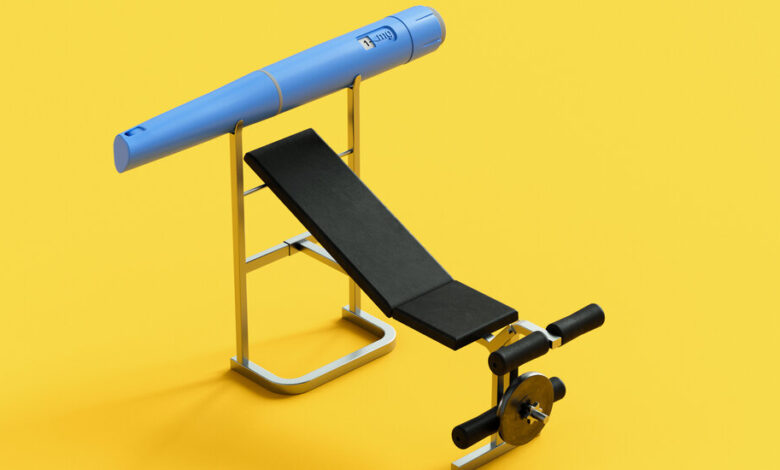The Race to Stop Ozempic Muscle Loss

As drugs like Ozempic become increasingly popular for weight loss, more doctors and patients are looking for ways to counteract the muscle loss that can happen on these medications — and companies are racing to meet that demand.
Luxury gyms are offering strength-training programs specifically marketed toward people taking these medications, promising to help clients “optimize their outcomes.” Nutritionists and meal-delivery services are creating plans to help patients pack in enough protein. And drug companies including Eli Lilly, which makes Mounjaro and Zepbound, are looking to develop combination treatments that prevent muscle loss.
“I know people are like, ‘Oh, we’re trying to fix the liability.’ It’s not that,” said Dr. Daniel Skovronsky, the chief scientific officer at Eli Lilly. The question, he said, is how to build on the benefits of medication to help patients lose more fat while preserving, or even gaining, more muscle.
Eli Lilly is partnering with BioAge Labs to test whether a compound called azelaprag could help people achieve a more optimal balance of muscle and fat, possibly helping people who are taking Mounjaro or Zepbound lose even more weight. The drug imitates a hormone produced during exercise that can improve muscle metabolism and function.
And last year, Eli Lilly acquired the biopharmaceutical company Versanis, which makes a drug that blocks receptors that regulate skeletal muscle and fat mass. “When it does that, muscles get bigger,” said Dr. Steven Heymsfield, a professor of metabolism and body composition at Pennington Biomedical Research Center in Louisiana who has studied the drug, called bimagrumab.
There’s also a trial underway testing bimagrumab and semaglutide, the substance in Ozempic and Wegovy, in adults with obesity. Later this year, the drugmaker Regeneron will begin a clinical trial testing semaglutide in combination with an antibody treatment that blocks receptors that regulate muscle growth. And on Tuesday, the Food and Drug Administration greenlit a clinical trial to study whether a compound previously tested as a treatment for muscle loss in older adults could help preserve muscle and shed more fat in people 60 and older taking a weight loss drug.
“These weight loss drugs, they basically cause the development of frailty in older patients in months instead of years,” said Dr. Mitchell Steiner, the chief executive of Veru, which is conducting the study.
But even if these studies are successful, it would be years before these new medications are available to patients taking drugs for weight loss.
In the meantime, doctors said, it’s critical for these patients to find ways to maintain their muscle. Older adults and postmenopausal women, in particular, are at risk for becoming frail or developing osteoporosis if they lose too much muscle, said Dr. Scott Hagan, an assistant professor of medicine at the University of Washington who studies obesity. But anyone who loses muscle could experience weakness and fatigue, Dr. Hagan said, and could be at an increased risk of falls and injuries.
“Just because we’re losing weight doesn’t always mean we’re getting healthier,” said Dr. Michelle Hauser, obesity medicine director of the Stanford Lifestyle and Weight Management Center.
Doctors tend to recommend two simple fixes to fight muscle loss: eating protein and doing strength training. Companies are capitalizing on both goals. In January, Abbott introduced a line of protein shakes geared at people taking drugs like Ozempic, and Daily Harvest, a meal delivery service, rolled out a new “companion food collection” for clients on the drugs.
Nutrition-focused startups like Nourish and Berry Street, which connect people with dietitians, have started promoting services specifically for people on these drugs. Nourish’s providers emphasize protein intake and pay particular attention to the risk of malnutrition for patients on weight loss drugs, said Dominique Adair, the company’s head of clinical quality.
Noom, a telehealth company that started by offering behavioral health coaching for weight loss and has since expanded to prescribe weight loss drugs, now has a Muscle Defense program that includes fitness videos and a protein tracker. The upscale gym chain Equinox now has a personal training program tailored to people on the medications. Obé Fitness, an online workout platform, partnered with a virtual care company that prescribes weight loss drugs to develop its MuscleGuard exercise program.
And in Minnesota, the health club LifeTime Fitness is piloting a clinic that not only provides personal training focused on weight lifting, but also offers compounded versions of weight loss drugs — unauthorized alternatives that the Food and Drug Administration has warned against using.
The nationwide chain plans to expand the program to “major markets” by the end of the year, a representative said.
A specialized program might help a patient preserve muscle, but most don’t need to cram protein powder into all their meals or start an intensive workout routine, Dr. Hagan said.
“What I try to emphasize is we’re not trying to make you into a bodybuilder or something,” he said. “Two sessions a week of light weights could be very effective.”
Source link



